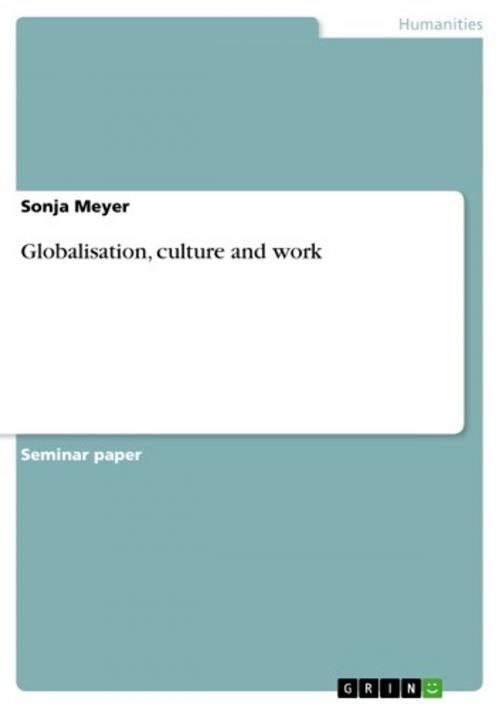Globalisation, culture and work
Nonfiction, Social & Cultural Studies, Social Science, Cultural Studies, Ethnic Studies| Author: | Sonja Meyer | ISBN: | 9783640186952 |
| Publisher: | GRIN Publishing | Publication: | October 14, 2008 |
| Imprint: | GRIN Publishing | Language: | English |
| Author: | Sonja Meyer |
| ISBN: | 9783640186952 |
| Publisher: | GRIN Publishing |
| Publication: | October 14, 2008 |
| Imprint: | GRIN Publishing |
| Language: | English |
Seminar paper from the year 2007 in the subject Cultural Studies - Basics and Definitions, grade: A, University of Otago ((New Zealand) Department of Anthropology), course: Labour and Society: Working Cultures, 18 entries in the bibliography, language: English, abstract: As the cartoon above suggests, workers all around the world are situated at the bottom of the power spectrum in the international economic world. Globalisation is a catch-all term, that nowadays seems to be relevant to every field of social science. It affects every part of the world and of our every day lives. This is not to say that the locality of our lives does not play a role in how we experience the globalising forces. Rather it leads us to analyse what globalisation exactly is, how it has been conceptualised in the academic debate and how it changes conditions for every one of us. This paper will firstly address the general question of globalisation, outlining the controversy and the different approaches to developments that are subsumed under the term globalisation. To assess in how far people on the ground, in this case workers, are active agents, it is important to consider what changes globalisation brings about for their specific environment, in this case the international labour market. Finally, it should be shown that globalisation is not an independent force that dominates us all, but one that is actively created by humanity and in which every one of us takes a little part to a certain extent.
Seminar paper from the year 2007 in the subject Cultural Studies - Basics and Definitions, grade: A, University of Otago ((New Zealand) Department of Anthropology), course: Labour and Society: Working Cultures, 18 entries in the bibliography, language: English, abstract: As the cartoon above suggests, workers all around the world are situated at the bottom of the power spectrum in the international economic world. Globalisation is a catch-all term, that nowadays seems to be relevant to every field of social science. It affects every part of the world and of our every day lives. This is not to say that the locality of our lives does not play a role in how we experience the globalising forces. Rather it leads us to analyse what globalisation exactly is, how it has been conceptualised in the academic debate and how it changes conditions for every one of us. This paper will firstly address the general question of globalisation, outlining the controversy and the different approaches to developments that are subsumed under the term globalisation. To assess in how far people on the ground, in this case workers, are active agents, it is important to consider what changes globalisation brings about for their specific environment, in this case the international labour market. Finally, it should be shown that globalisation is not an independent force that dominates us all, but one that is actively created by humanity and in which every one of us takes a little part to a certain extent.















